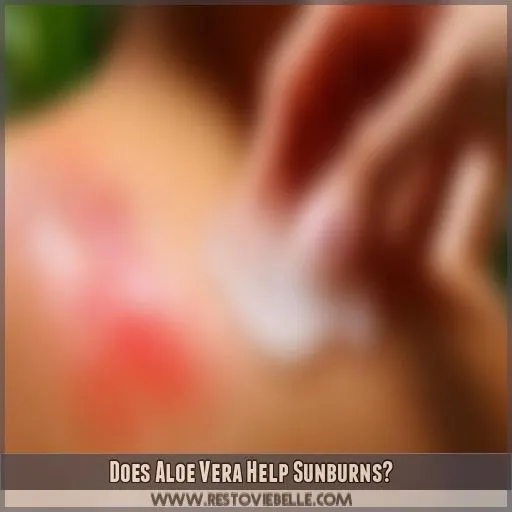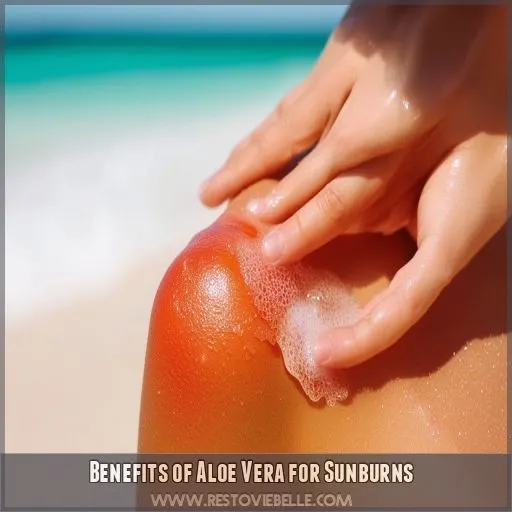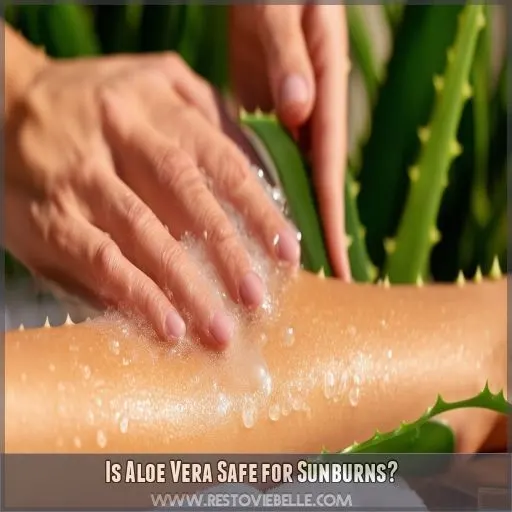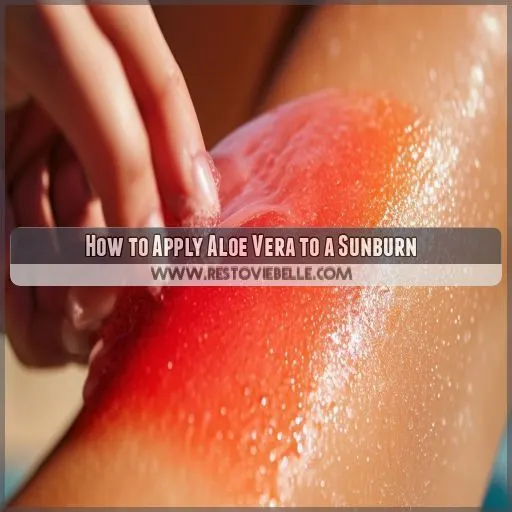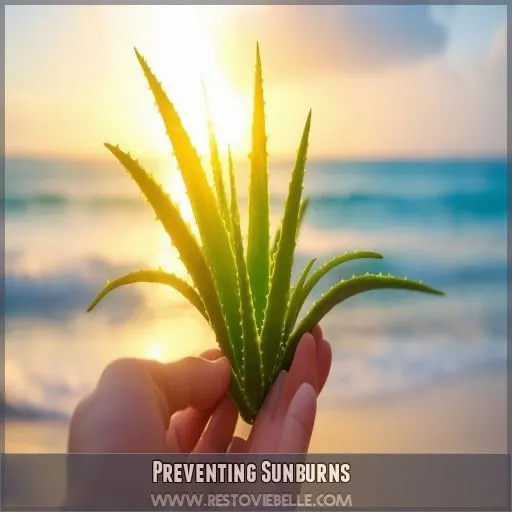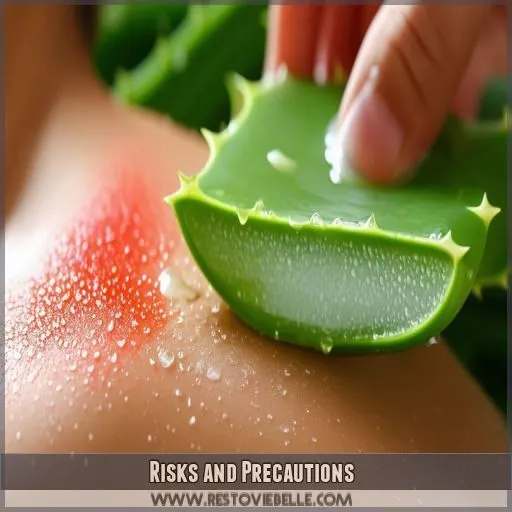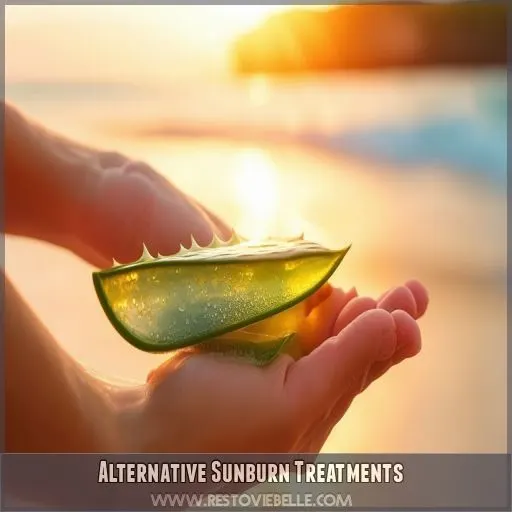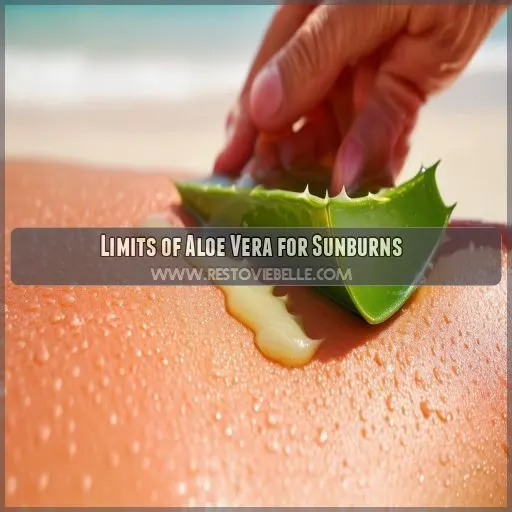This site is supported by our readers. We may earn a commission, at no cost to you, if you purchase through links.
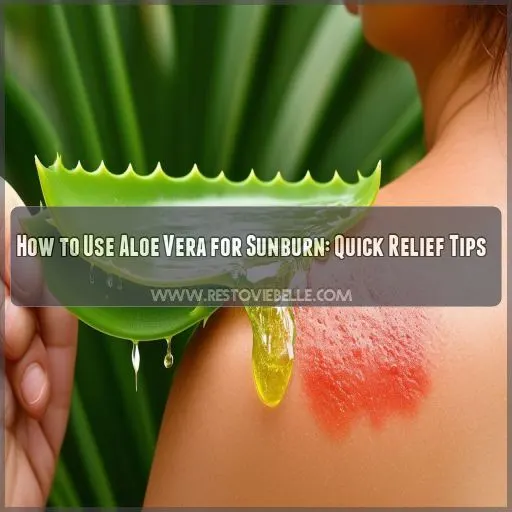 You’ve got options when it comes to using aloe vera for sunburn relief. You can go straight to the source and apply the gel or juice directly from the plant’s leaves. If you’re buying, look for pure or 100% aloe vera gel, or a lotion or moisturiser with aloe vera. Apply a thin layer to the affected areas several times a day. For extra relief, chill the gel before application.
You’ve got options when it comes to using aloe vera for sunburn relief. You can go straight to the source and apply the gel or juice directly from the plant’s leaves. If you’re buying, look for pure or 100% aloe vera gel, or a lotion or moisturiser with aloe vera. Apply a thin layer to the affected areas several times a day. For extra relief, chill the gel before application.
Stay tuned for more tips on using aloe vera for sunburn, as well as insights into its benefits and limitations.
Table Of Contents
- Key Takeaways
- Does Aloe Vera Help Sunburns?
- Benefits of Aloe Vera for Sunburns
- Is Aloe Vera Safe for Sunburns?
- How to Apply Aloe Vera to a Sunburn
- Preventing Sunburns
- Risks and Precautions
- Alternative Sunburn Treatments
- What to Know About Sunburns
- Limits of Aloe Vera for Sunburns
- Insider’s Takeaway
- Frequently Asked Questions (FAQs)
- Can you put straight aloe vera on sunburn?
- How do you apply fresh aloe vera to a burn?
- Is aloe better than lotion for sunburn?
- What heals sunburn fast?
- Can I use aloe vera on my face for sunburn?
- How long does it take for aloe vera to work on sunburn?
- Can I use aloe vera for sunburn blisters?
- Can I use aloe vera to prevent sunburn?
- Can I use aloe vera to tan safely?
- Conclusion
Key Takeaways
- Aloe vera is a soothing superhero for sunburned skin, offering cooling relief and reducing pain and inflammation.
- It’s not a cure-all: while aloe vera helps ease symptoms, it won’t prevent or heal severe sunburns, so always use sunscreen and protective clothing first.
- Pure aloe vera gel, applied gently and frequently, is best for sunburn relief. Keep it chilled for an extra cooling effect.
- If you’ve had a bad reaction to aloe vera before, steer clear and opt for alternatives like witch hazel or honey.
Does Aloe Vera Help Sunburns?
You’ve probably heard that aloe vera is a sunburn savior, but does it really work? Let’s separate fact from fiction and explore the science behind aloe vera’s effects on sunburns.
Debunking Common Myths
You might’ve heard that aloe vera is the go-to solution for sunburns, but is it really effective? Let’s separate fact from fiction:
- Myth: Aloe vera prevents sunburns.
Fact: Aloe vera isn’t a preventative measure for sunburns. It’s not a replacement for sunscreen, so make sure you’re still lathering up!
- Myth: Aloe vera speeds up the healing of sunburns.
Fact: While aloe vera has beneficial properties, it doesn’t make sunburns heal faster. It can help soothe symptoms, but it won’t accelerate the healing process.
- Myth: Aloe vera is a cure-all for sunburns.
Fact: Aloe vera is helpful for managing sunburn discomfort, but it’s not a cure-all. Severe burns may require medical attention, and aloe vera should be avoided on open wounds.
The Science Behind Aloe Vera
Aloe vera has been a go-to for sunburn relief for centuries. The gel from this plant is known for its cooling sensation, which can help ease the pain of sunburn. But don’t expect it to make your sunburn heal faster or prevent sun damage.
What Aloe Vera Can and Can’t Do
Aloe vera is a popular go-to for sunburn relief, but does it really work? Let’s separate the facts from the fiction:
- Aloe vera can provide a cooling sensation, reducing pain and soothing inflamed skin.
- However, it can’t prevent sunburns or speed up their healing.
- Aloe vera can moisturize and protect sun-damaged skin.
- But, it can’t replace sunscreen or cure severe burns.
Benefits of Aloe Vera for Sunburns
Aloe vera has been a go-to remedy for sunburns, but does it really work? Let’s explore the benefits of aloe vera for sunburns and find out.
Anti-Inflammatory and Antioxidant Properties
Aloe vera is well-known for its anti-inflammatory and antioxidant qualities, which can be a real lifesaver when it comes to soothing sunburned skin. Here’s a quick overview of how these properties work to bring relief:
| Property | Description | Benefit |
|---|---|---|
| Anti-Inflammatory | Reduces inflammation and pain | Helps calm the skin and ease discomfort |
| Antioxidant | Combats free radical damage | Assists in skin repair and regeneration |
While aloe vera won’t make your sunburn disappear overnight, it can definitely lend a helping hand in reducing the redness and inflammation associated with sun damage.
Soothing and Moisturizing Sunburned Skin
Aloe vera is a moisturising hero, helping to soothe that tight, dry feeling sunburned skin brings. Its natural compounds provide a cooling sensation, reducing pain and making healing more comfortable.
Preventing Excessive Peeling and Irritation
- Aloe vera can help reduce skin irritation and promote healing after sun exposure.
- Its natural compounds, like aloin, have anti-inflammatory and antioxidant benefits, supporting the skin’s repair process.
- By keeping sunburned skin moisturized, aloe vera helps minimize the risk of excessive peeling.
- Remember, aloe vera isn’t a cure for sunburn. Always prioritize proper sun protection.
Is Aloe Vera Safe for Sunburns?
You might be wondering if aloe vera is actually safe to use on sunburns. After all, you don’t want to make things worse! Well, the good news is that aloe vera is generally considered safe for most people. But there are a few things you should keep in mind.
Allergic Reactions and Irritant Dermatitis
While aloe vera is generally safe, some folks experience allergic or irritant dermatitis reactions to aloe vera products. If you get itchy or a rash, you might be reacting badly. The rate of allergic reactions is low, but it’s important to read the labels of store-bought aloe vera carefully, especially if you have allergies.
Patch Testing and Avoiding Bad Reactions
Trying new things on your skin can be a little nerve-wracking, especially if you have sensitive skin. That’s why patch testing is your BFF when you’re introducing something new to your skincare routine.
Here’s the lowdown on patch testing:
- Choose a small, inconspicuous area of skin, like the inside of your wrist or the bend of your elbow.
- Apply a tiny amount of the aloe vera product to the chosen area.
- Wait 24 hours. If your skin doesn’t show any signs of irritation, redness, or itching, you’re good to go!
How to Apply Aloe Vera to a Sunburn
Now that you know aloe vera can help soothe your sunburn, let’s get into how to apply it for maximum relief. Here, we’ll explore the different ways to use aloe vera, whether it’s straight from the plant or a store-bought product, to give your skin some much-needed TLC.
Using Fresh Aloe Vera Gel or Store-Bought Products
You can apply aloe vera gel directly from the plant or opt for store-bought products like gels or lotions. Here are some tips:
- Choose pure or 100% aloe vera gel to minimize the risk of irritation.
- Store-bought gels are convenient and often enriched with other soothing ingredients.
- Fresh aloe vera gel can be extracted from the plant’s leaves, offering a natural, DIY option.
- Consider keeping your aloe vera gel chilled for an extra cooling effect on sunburned skin.
Applying Aloe Vera Gently and Frequently
When applying aloe vera to a sunburn, remember that frequency matters. Apply a thin layer of the gel gently to the affected areas several times throughout the day. You don’t want to rub it in vigorously or aggressively. Think of it like patting a child to soothe them after they’ve scraped their knee – gentle and calming.
Chilling Aloe Vera for Extra Relief
Chilling aloe vera before application can enhance its soothing effect. The cool temperature helps calm inflamed skin and provides a nice, cool feeling. Store your aloe vera gel in the fridge for a quick, cooling remedy.
Preventing Sunburns
While aloe vera is great for soothing sunburned skin, preventing sunburns in the first place is even better. Let’s explore some practical tips to keep those sunburns at bay.
The Importance of Sunscreen and Protective Clothing
While aloe vera can help soothe sunburn, prevention is key. Slip on some sun-protective clothing and slather on sunscreen with an SPF of at least 30 for daily protection. For beach days, go for SPF 50 or higher.
Minimizing Sunburn Irritation With Cool Showers and Hydration
If you’re already sunburned, cool showers can be a soothing remedy. They help take the heat off inflamed skin and offer some relief. Drinking lots of water is another way to keep your body hydrated and aid the healing process.
Alternatives to Aloe Vera for Sunburn Relief
If you’re looking for alternatives to aloe vera, here are a few options for sunburn relief and prevention:
- Cold compresses
- Cool baths or showers
- Over-the-counter pain relievers like ibuprofen or acetaminophen
- Soothing agents like witch hazel or honey
Risks and Precautions
While aloe vera is generally safe, it’s not a cure-all for sunburns. There are some important precautions to keep in mind when using aloe vera, especially with severe burns and open wounds.
Let’s take a closer look at the potential risks and precautions to take when using this plant for sunburn relief.
Avoiding Aloe Vera on Severe Burns and Open Wounds
While aloe vera is great for minor sunburns, it’s not meant for severe burns or open wounds. So, if you’re dealing with a second-degree sunburn or something more serious, skip the aloe vera and head straight to your dermatologist for proper medical treatment.
Performing Patch Tests and Avoiding Eye Contact
While aloe vera is generally safe, it’s better to be safe than sorry. Always do a patch test on a small area of skin first. This way, you can make sure your skin doesn’t react badly. Also, be careful to avoid getting aloe vera in your eyes, as it can cause irritation.
Discontinuing Use and Consulting a Doctor
If you experience any adverse reactions, stop using aloe vera and consult a healthcare professional. Trust your instincts and listen to your body. It’s always better to be safe than sorry.
Alternative Sunburn Treatments
While aloe vera is a popular go-to for sunburn relief, there are other effective ways to ease the pain and speed up healing. Let’s explore some alternative treatments to help you beat the burn.
Cold Compresses and Cool Baths
If you’re feeling the heat, try a cold compress or a cool bath to take the edge off. These simple remedies can help soothe your skin and offer some welcome relief.
Over-the-Counter Pain Relievers and Hydration
If your sunburn is causing you pain, you can take over-the-counter pain relievers like ibuprofen or acetaminophen to help ease the discomfort.
Here are some additional tips to keep in mind:
- Stay hydrated: Drink plenty of fluids to help your skin heal and keep your body cool.
- Cool it down: Apply cold compresses or take cool baths/showers to soothe the affected area.
- Be cautious: Always read the labels and follow the instructions on any over-the-counter medications you take.
Other Soothing Agents Like Witch Hazel and Honey
If aloe vera ain’t your thing, don’t sweat it. You’ve got options like witch hazel, a natural astringent, and honey, nature’s liquid gold, to soothe that sunburn. These alternatives offer relief, too.
What to Know About Sunburns
Sunburns are No joke, and they’re more common than you might think. Nearly a third of adults in the U.S. get sunburned each year. That’s a lot of sore, red skin.
Let’s take a closer look at what sunburns are, why they happen, and how to prevent and treat them effectively.
Sunburn Statistics and Causes
Nearly a third of US adults get sunburnt annually. Sunburn happens when skin is exposed to UV light, even through clothing. Any body part can burn, including the scalp, lips, eyes, and earlobes.
Risks of Repeated Sunburns and Skin Cancer
Sunburns aren’t just a temporary ouchie. They’re a warning sign that you’re doing lasting harm to your skin. Getting sunburned over and over hikes up your chances of getting skin cancer. So, slap on that sunscreen and cover up. It’s not just about looking cool in shades and a hat—it’s about staying safe.
Aloe Vera’s Anti-Inflammatory and Antioxidant Properties
Aloe vera is known for its anti-inflammatory and antioxidant properties, which can be beneficial for sunburn relief. Here’s what you should know:
- Aloe vera contains aloin, a natural compound with potent anti-inflammatory and antioxidant effects.
- Research supports the use of aloe vera for treating first- and second-degree burns, making it ideal for sunburn relief.
- Aloe vera gel reduces skin redness caused by UV exposure and promotes healing. It may even outperform petroleum jelly and silver sulfadiazine in healing burns.
Limits of Aloe Vera for Sunburns
While aloe vera is a popular go-to for sunburn relief, it’s important to know its limits. It’s not a cure-all and has its downsides.
Aloe vera won’t prevent or cure sunburns, and it’s not a substitute for sunscreen. It may help soothe and heal mild sunburns, but it’s not effective for severe burns.
Aloe Vera is Not a Cure for Sunburn
Aloe vera is a soothing sunburn remedy, but it’s not a cure-all.
It can’t prevent sunburns or undo sun damage.
While it helps soothe and heal the skin, it’s not a standalone treatment.
A study found that aloe vera cream didn’t speed up sunburn healing.
It’s a helpful addition to your sunburn relief toolkit, but don’t rely on it as your only solution.
Potential Side Effects and Allergic Reactions
While aloe vera is generally safe, it can cause skin reactions in some people. Potential side effects include itching, burning, or eczema. If you experience any of these symptoms, it’s best to stop using aloe vera and give your skin some TLC.
Choosing Pure Aloe Vera Products and Consulting a Doctor
When choosing aloe vera products, opt for pure or 100% aloe vera gel to minimize the risk of irritation. Steer clear of additives and fragrances, which can aggravate sensitive skin. If you’ve had a bad reaction to aloe vera before, it’s best to avoid it altogether.
If you experience any adverse reactions, such as itching or a rash, stop using aloe vera and consult your doctor. They can advise on alternative treatments and assess whether your reaction warrants medical attention.
Insider’s Takeaway
Now that you’re clued up on aloe vera’s ins and outs for sunburn, it’s time to check out some tips for using it effectively. From application techniques to choosing the right products, you’ll be an aloe pro in no time.
Tips for Using Aloe Vera Effectively for Sunburn Relief
- Choose pure or 100% aloe vera gel.
- Apply a thin layer to the affected area, and reapply throughout the day as needed.
- Keep the gel chilled for extra cooling relief.
- If you’ve had a bad reaction to aloe vera before, avoid using it.
- Always follow instructions on pre-packaged products.
Importance of Prevention and Sun Protection
While aloe vera is a handy tool for soothing sunburned skin, prevention is still the best medicine. Here are three ways to protect yourself from the sun’s rays:
- Slip on a shirt: Cover up with clothing to block UV rays. Choose tightly woven fabrics and dark or bright colours, which offer better protection than light, pastel shades.
- Slop on sunscreen: Go for a broad-spectrum sunscreen with an SPF of at least 30. Reapply every two hours, or after swimming or sweating.
- Slap on a hat: A wide-brimmed hat shields your face, neck, and ears from the sun.
Frequently Asked Questions (FAQs)
Can you put straight aloe vera on sunburn?
You can apply aloe vera directly to your skin to help soothe sunburn. But, it won’t prevent or cure sunburn, and it’s not a substitute for sunscreen.
How do you apply fresh aloe vera to a burn?
First, grab some older leaves from the bottom of an aloe vera plant. Cut off the spines, slice the leaves, and score the insides to release the aloe. Then, clean your burn and apply a thick layer of the gel 2-3 times a day.
Is aloe better than lotion for sunburn?
Research shows that aloe vera’s anti-inflammatory properties may help heal sunburns. It’s a common ingredient in lotions, so you can get the best of both worlds. If you prefer a lotion, look for one with aloe vera.
What heals sunburn fast?
You can’t get rid of sunburn overnight. To speed up healing, try aloe vera gel, a petroleum-free balm, or a gentle moisturiser with soothing ingredients like chamomile. Take an NSAID like ibuprofen, get plenty of rest, and stay hydrated.
Can I use aloe vera on my face for sunburn?
You can use aloe vera on your face for sunburn, but it won’t make it heal faster. It can, however, help soothe the pain and swelling. Just make sure to do a patch test first, as some people can have bad reactions.
How long does it take for aloe vera to work on sunburn?
There’s no definitive proof that aloe vera speeds up sunburn healing, but some studies suggest it may increase healing time by up to 9 days. However, results vary, so take these findings with a pinch of salt.
Can I use aloe vera for sunburn blisters?
While aloe vera can help soothe and heal sunburn, it’s not a cure-all. If you have blisters, avoid popping them to prevent infection. See a doctor if blisters cover a large portion of your body.
Can I use aloe vera to prevent sunburn?
No, aloe vera won’t prevent sunburn. It’s not a miracle cure. But it can help soothe and heal mild to moderate sunburns. To prevent sunburn, always use sunscreen with an SPF of at least
Can I use aloe vera to tan safely?
Aloe vera won’t make you more tan, but it can help reduce a tan. It’s generally safe to use on skin, but a small number of people may have an allergic reaction. Always do a patch test first.
Conclusion
So, does aloe vera help with sunburns? Absolutely!
It’s a soothing superhero for sun-scorched skin. But remember, it’s not a cure-all.
Use it as a tool in your sunburn relief toolkit, along with sunscreen and protective clothing to prevent sun damage in the first place.
When using aloe vera, opt for pure gel, and apply it gently and frequently for the best results.
If you’re buying, look for products with aloe vera listed as an active ingredient.
Keep in mind, severe burns require medical attention, so don’t rely solely on aloe vera for serious sun mishaps.

